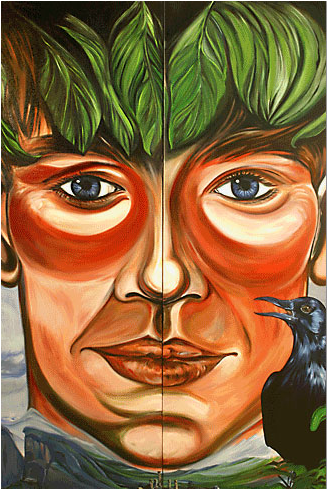Apollo
The ancient Greek and Roman God of light, healing, music, poetry, prophecy, and manly beauty; the son of Leto and twin brother of Artemis; represented harmony, order and reason, while his very opposite brother, Dionysus (God of wine), represented ecstasy and disorder, as reflected in the adjectives 'Apollonian' and 'Dionysian'.
The Greeks believed the two were complimentary. Phoebus for the Romans.
Laurel leaves for hair. Apollo “in whose eyes no evil could be found” (Homer 9th century B.C.), and his companion, the crow, stare on while a 14th century Catholic monastery sits perched in the hills nearby.
Truth and beauty are consistencies recognizable in music and art, legacies left by men hoping to capture human emotions in an existence where almost everything else is fleeting and in flux. Modern Greece is now a monotheistic society, but its roots in polytheism explored a more complex unity between higher moral aspirations and inherent human moral dilemmas transcending culture, belief systems, changing customs and changing times.
Truth and beauty are subjective, and differ from society to society and from culture to culture. However, the preoccupation with fair skin and blue eyes as an ideal of beauty has persisted for thousands of years, no less so in the world today (if you have been to Orange County in California, or were born a person of colour, you will know what I mean). Apollo is represented as a German youth whose importance in this century partly led to the death of millions of people, mainly darker-featured Jews and gypsies. The importance of beauty in today's world is mesmerizing and shallow, especially in western cultures, distracting from the real and concrete issues affecting people, societies, and the planet as a whole.
Yet some things believed to be superficial or superstituous have real effect and consequences. Apollo is thus mesmerized by the insubstantial and inconsequential, deep in a trance caused by the leaching of volcanic gases from a crack deep in the Earth. Even today, one can fall under the spell of the Gods at the Oracle of Delphi in modern Greece, from these very real gases leaching from deep in the Earth.
Spring / noon
The ancient Greek and Roman God of light, healing, music, poetry, prophecy, and manly beauty; the son of Leto and twin brother of Artemis; represented harmony, order and reason, while his very opposite brother, Dionysus (God of wine), represented ecstasy and disorder, as reflected in the adjectives 'Apollonian' and 'Dionysian'.
The Greeks believed the two were complimentary. Phoebus for the Romans.
Laurel leaves for hair. Apollo “in whose eyes no evil could be found” (Homer 9th century B.C.), and his companion, the crow, stare on while a 14th century Catholic monastery sits perched in the hills nearby.
Truth and beauty are consistencies recognizable in music and art, legacies left by men hoping to capture human emotions in an existence where almost everything else is fleeting and in flux. Modern Greece is now a monotheistic society, but its roots in polytheism explored a more complex unity between higher moral aspirations and inherent human moral dilemmas transcending culture, belief systems, changing customs and changing times.
Truth and beauty are subjective, and differ from society to society and from culture to culture. However, the preoccupation with fair skin and blue eyes as an ideal of beauty has persisted for thousands of years, no less so in the world today (if you have been to Orange County in California, or were born a person of colour, you will know what I mean). Apollo is represented as a German youth whose importance in this century partly led to the death of millions of people, mainly darker-featured Jews and gypsies. The importance of beauty in today's world is mesmerizing and shallow, especially in western cultures, distracting from the real and concrete issues affecting people, societies, and the planet as a whole.
Yet some things believed to be superficial or superstituous have real effect and consequences. Apollo is thus mesmerized by the insubstantial and inconsequential, deep in a trance caused by the leaching of volcanic gases from a crack deep in the Earth. Even today, one can fall under the spell of the Gods at the Oracle of Delphi in modern Greece, from these very real gases leaching from deep in the Earth.
Spring / noon
© Copyright 2016 Jeffrey A’Hearn

